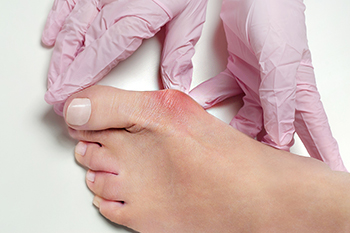
A bunion is a bony protrusion at the base of the big toe that can cause significant discomfort and affect daily activities. Luckily, there are various bunion treatment options available to alleviate symptoms and restore foot function. For mild to moderate cases, nonsurgical approaches include wearing wider shoes with supportive soles, using bunion shields and pads, and taking anti-inflammatory medications. Night splints and toe separators may also help correct toe alignment and stretch tight soft tissues. Custom orthotics can address foot mechanics and prevent further progression of the deformity. When conservative measures fail to bring relief, surgical intervention may be necessary. Bunion surgery, or bunionectomy, aims to correct the misalignment of the big toe joint and remove bony growths. This type of surgery is not without risks and may not always be successful. Therefore, early recognition, accurate diagnosis, and appropriate treatment are a must. A podiatrist can help to develop a personalized treatment plan that is best tailored to your needs. If you are struggling with persistent bunion pain, it is suggested that you schedule an appointment with a podiatrist.
If you are suffering from bunions, contact one of our podiatrists of Grobowski Foot & Ankle. our doctors can provide the care you need to keep you pain-free and on your feet.
What Is a Bunion?
A bunion is formed of swollen tissue or an enlargement of boney growth, usually located at the base joint of the toe that connects to the foot. The swelling occurs due to the bones in the big toe shifting inward, which impacts the other toes of the foot. This causes the area around the base of the big toe to become inflamed and painful.
Why Do Bunions Form?
Genetics – Susceptibility to bunions are often hereditary
Stress on the feet – Poorly fitted and uncomfortable footwear that places stress on feet, such as heels, can worsen existing bunions
How Are Bunions Diagnosed?
Doctors often perform two tests – blood tests and x-rays – when trying to diagnose bunions, especially in the early stages of development. Blood tests help determine if the foot pain is being caused by something else, such as arthritis, while x-rays provide a clear picture of your bone structure to your doctor.
How Are Bunions Treated?
- Refrain from wearing heels or similar shoes that cause discomfort
- Select wider shoes that can provide more comfort and reduce pain
- Anti-inflammatory and pain management drugs
- Orthotics or foot inserts
- Surgery
If you have any questions, please feel free to contact one of our offices located in Bellevue, Seattle, and Issaquah, WA, . We offer the newest diagnostic and treatment technologies for all your foot care needs.
